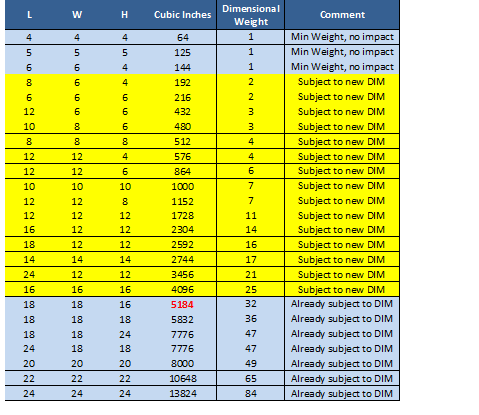One of the largest rate increases in the history of the parcel industry was just announced. Effective January 1, 2015, FedEx Ground will apply dimensional weight pricing to all shipments. Currently, FedEx Ground applies dimensional weight pricing only to packages measuring three cubic feet (5184 cubic inches) or greater.
FedEx justifies the change as a way to align the FedEx Ground dimensional weight pricing with FedEx Express, and that "dimensional weight pricing is a common industry practice that sets the transportation price based on package volume-the amount of space a package occupies in relation to its actual weight."
Per the 2014 FedEx Service Guide, Express dimensional weight is calculated by multiplying the length by width by height of each package in inches and dividing the total by 166 (for shipments within the U.S. and shipments between the U.S. and Puerto Rico). If the dimensional weight exceeds the actual weight, charges may be assessed based on the dimensional weight. Dimensions of one-half inch or greater are rounded up to the next whole number; dimensions less than one-half inch are rounded down. The final calculation is rounded up to the next whole pound. Dimensional weight applies per package or per shipment for domestic shipments. We can assume the new rules for FedEx Ground dimensional weight rating will match the above calculations.
Shippers, make no mistake about it: this is a huge rate increase for B2B and B2C shippers alike. The majority of Ground packages are less than 3 cubic feet. If you think you are not impacted because you've negotiated non-standard dimensional divisor greater than 166, do not make the mistake of thinking you are not adversely impacted by this change! Many volume shippers have contract dimensional divisors (greater than the standard 166), but non-specific cubic thresholds. So unless your contract specifies the 3 cubic foot exception, this change will affect you!
Table 1 shows the new dimensional weight calculations applied to the 25 most common box sizes sold in the U.S. The first three box sizes result in a dimensional weight of 1 pound - the absolute minimum weight - and therefore are not impacted by the change. However, the next fifteen box sizes (highlighted in yellow) will be subject to the new dimensional policy in 2015. The remaining seven box sizes - those at or above 5184 cubic inches - are already impacted by the current dimensional rate calculation, and as such are not incrementally impacted by the announced change.

If your company ships FedEx Ground or FedEx Home Delivery using any of the box sizes highlighted in yellow, you are facing a major rate increase. The annual financial impact is well into the hundreds of millions, and that's just FedEx. The big question is: will UPS follow suit?
Well, if history is our guide, bet your bottom dollar. FedEx and UPS have a long history of matching one another's pricing strategies. General rate increases - especially for Ground shipments - have matched over the years. Accessorial and special handling charges are practically identical. UPS Standard rates match the FedEx published rates to the penny.
In 2011, when FedEx announced the dimensional divisor change from 194 to 166, UPS quickly followed suit. That singular change has resulted in a half a billion windfall for the carriers. And the announced FedEx Ground change has the potential to have an even greater impact on shipper's costs!
Last year, FedEx Ground handled more than 1 billion Ground packages, while UPS delivered more than 12 billion.
So what can shippers do?
Step 1 - Understand the impact to your business. Take another look at Table 1, and do a similar analysis using your own box sizes. Use actual or even average weights in your analysis to compare with the new dimensional weight.
Step 2 - Contact your FedEx Representative in an effort to amend your contract with a customized cubic inch threshold and/or dimensional factor. FedEx knows it will not be able to get away with the Service Guide change for a percentage of its customers. Or at least not right away. I envision FedEx "grandfathering" the 3-foot cubic allowance, but scaling back on the threshold in each year of multiple-year agreements. Keep in mind that you have a lot more negotiating leverage now than you will if and when UPS matches the FedEx Ground dimensional policy.
Step 3 - Seek help. Shipware has established a review and action plan for shippers concerned about this rate change. Interested shippers should email corporate@ShipwareLLC.com to get details.
Rob Martinez, DLP is President & CEO of Shipware LLC, an innovative parcel audit and consulting firm that helps volume parcel shippers reduce shipping costs 10%-30%. Rob offers 25 years' experience negotiating parcel contracts - on both sides of the negotiating table - for some of the most recognizable brands in the world, and is a sought after speaker and industry thought leader. He welcomes questions and comments, and can be reached at 858-879-2020 Ext 114 or rob@shipware.com.
FedEx justifies the change as a way to align the FedEx Ground dimensional weight pricing with FedEx Express, and that "dimensional weight pricing is a common industry practice that sets the transportation price based on package volume-the amount of space a package occupies in relation to its actual weight."
Per the 2014 FedEx Service Guide, Express dimensional weight is calculated by multiplying the length by width by height of each package in inches and dividing the total by 166 (for shipments within the U.S. and shipments between the U.S. and Puerto Rico). If the dimensional weight exceeds the actual weight, charges may be assessed based on the dimensional weight. Dimensions of one-half inch or greater are rounded up to the next whole number; dimensions less than one-half inch are rounded down. The final calculation is rounded up to the next whole pound. Dimensional weight applies per package or per shipment for domestic shipments. We can assume the new rules for FedEx Ground dimensional weight rating will match the above calculations.
Shippers, make no mistake about it: this is a huge rate increase for B2B and B2C shippers alike. The majority of Ground packages are less than 3 cubic feet. If you think you are not impacted because you've negotiated non-standard dimensional divisor greater than 166, do not make the mistake of thinking you are not adversely impacted by this change! Many volume shippers have contract dimensional divisors (greater than the standard 166), but non-specific cubic thresholds. So unless your contract specifies the 3 cubic foot exception, this change will affect you!
Table 1 shows the new dimensional weight calculations applied to the 25 most common box sizes sold in the U.S. The first three box sizes result in a dimensional weight of 1 pound - the absolute minimum weight - and therefore are not impacted by the change. However, the next fifteen box sizes (highlighted in yellow) will be subject to the new dimensional policy in 2015. The remaining seven box sizes - those at or above 5184 cubic inches - are already impacted by the current dimensional rate calculation, and as such are not incrementally impacted by the announced change.

If your company ships FedEx Ground or FedEx Home Delivery using any of the box sizes highlighted in yellow, you are facing a major rate increase. The annual financial impact is well into the hundreds of millions, and that's just FedEx. The big question is: will UPS follow suit?
Well, if history is our guide, bet your bottom dollar. FedEx and UPS have a long history of matching one another's pricing strategies. General rate increases - especially for Ground shipments - have matched over the years. Accessorial and special handling charges are practically identical. UPS Standard rates match the FedEx published rates to the penny.
In 2011, when FedEx announced the dimensional divisor change from 194 to 166, UPS quickly followed suit. That singular change has resulted in a half a billion windfall for the carriers. And the announced FedEx Ground change has the potential to have an even greater impact on shipper's costs!
Last year, FedEx Ground handled more than 1 billion Ground packages, while UPS delivered more than 12 billion.
So what can shippers do?
Step 1 - Understand the impact to your business. Take another look at Table 1, and do a similar analysis using your own box sizes. Use actual or even average weights in your analysis to compare with the new dimensional weight.
Step 2 - Contact your FedEx Representative in an effort to amend your contract with a customized cubic inch threshold and/or dimensional factor. FedEx knows it will not be able to get away with the Service Guide change for a percentage of its customers. Or at least not right away. I envision FedEx "grandfathering" the 3-foot cubic allowance, but scaling back on the threshold in each year of multiple-year agreements. Keep in mind that you have a lot more negotiating leverage now than you will if and when UPS matches the FedEx Ground dimensional policy.
Step 3 - Seek help. Shipware has established a review and action plan for shippers concerned about this rate change. Interested shippers should email corporate@ShipwareLLC.com to get details.
Rob Martinez, DLP is President & CEO of Shipware LLC, an innovative parcel audit and consulting firm that helps volume parcel shippers reduce shipping costs 10%-30%. Rob offers 25 years' experience negotiating parcel contracts - on both sides of the negotiating table - for some of the most recognizable brands in the world, and is a sought after speaker and industry thought leader. He welcomes questions and comments, and can be reached at 858-879-2020 Ext 114 or rob@shipware.com.









